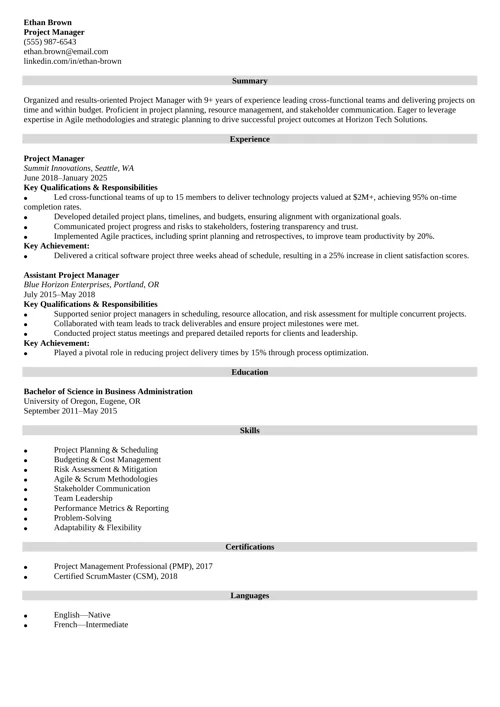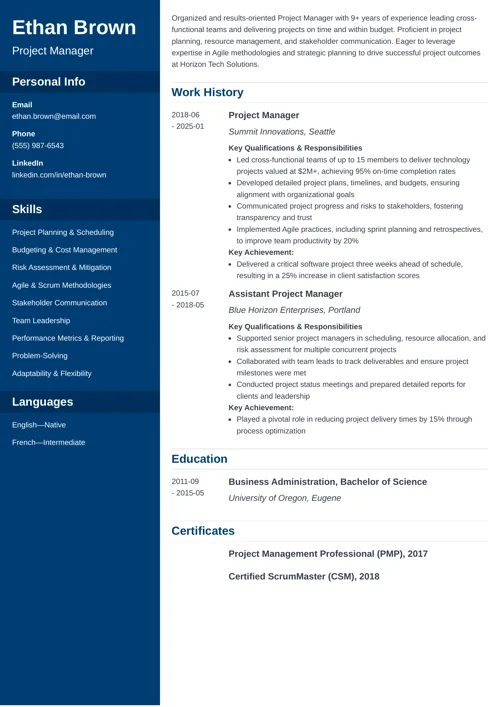What Are Power Skills? Definition + Examples to Learn
Create Your Resume NowWhat are power skills? Undoubtedly, they're not just another term for soft skills. Focusing on improving your power skills is the best strategy to prepare for the job market changes caused by AI. Read on, and I'll tell you everything you need to know to invest in your power skills!
This guide will show you:
- The power skills definition.
- Essential power skills examples.
- Why power skills are crucial in the job market influenced by generative AI.
Want to save time and have your resume ready in 5 minutes? Try our resume builder. It’s fast and easy to use. Plus, you’ll get ready-made content to add with one click. See 20+ resume templates and create your resume here.
Sample resume made with our builder—See more resume examples here.
One of our users, Brittanya, had this to say:
Zety really helped me create the best resume possible. It pointed out how things could be better on my existing resume and suggested many things to be re-worded or removed.
Check these other guides about professional skills:
- 15 Best Skills for Your Resume + Expert Tips
- Everything About Professional Skills for Your Resume
- Personal Skills for Your Resume: Definition + Examples
- Everything About Skill Levels on a Resume
- What Is Creative Thinking?
What are Power Skills?
Power skills are transferable competencies that include interpersonal, emotional, and cognitive abilities such as collaboration, leadership, effective communication, and more. They allow individuals to adapt to modern, ever-changing work environments and can't be replaced by technology.
Read more: Everything You Should Know About Top Employability Skills
Power Skills vs. Soft Skills
As you’ve probably already noticed, power skills appear to be very similar to soft skills. And indeed, they are. But as the importance of investing in soft skills was often downplayed in the past, some rebranding was much needed.
Hence, the term power skills was coined, which perfectly highlights their importance in the modern world. “Power skills” is much more than just another name for soft skills—this term is like a new lease of life for these essential abilities, which are impossible to measure objectively, contrary to easily quantifiable hard skills.
You may wonder why power skills are important? They are crucial for effective leadership, teamwork, and optimal workweek productivity, that’s why both companies and individuals should get to know the power skills definition and ways to develop these skills.
Power skills may not be easily measurable, but the results of investing in them are anything but. According to the Annual PMI Global Survey on Project Management, emphasizing power skills noticeably increased the success rate of meeting business goals.
No words better describe the true nature of soft and hard skills than this quote from a 2019 blog post by Josh Bersin, a renowned Global Industry Analyst and HR expert. What’s more, my research has shown that he was probably the first pioneer who coined the term “power skills.” So, without further ado, let’s see what he had to say about the difference between hard and soft skills:
Hard Skills are soft (they change all the time, are constantly being obsoleted, and are relatively easy to learn), and Soft Skills are hard (they are difficult to build, critical, and take extreme effort to obtain).
As you can see, there’s truly nothing soft about soft skills and the term “power skills” is completely well-deserved.
Read more: What Are Soft Skills? The Best Examples for Your Resume
Creating a resume with our builder is incredibly simple. Follow our step-by-step guide and use content from Certified Professional Resume Writers to have a resume ready in minutes.
When you’re done, Zety’s resume builder will score your resume and our resume checker will tell you exactly how to make it better.
Power Skills Examples
With workplaces evolving towards increased automation and remote work, power skills are becoming increasingly essential for overall success. Let’s take a closer look at the main power skills examples.
1. Communication Skills
Effective communication skills are becoming more important than ever. With the rising popularity of working from home causing plenty of team interactions to happen through video conferencing and texting, being able to understand people well and efficiently convey your ideas is, indeed, a power skill.
2. Leadership
As mentioned in the Udemy Workplace Learning Trends Report, companies that offer leadership training to all of their workers are 4.2 more likely to beat those who don’t in terms of revenue increase.
Growing leadership skills among all employees is an innovative approach, as the traditional approach viewed them as necessary only for managerial positions. However, a recent study by Gallup has shown that companies fail to hire suitably qualified candidates for manager job openings a staggering 82% of the time.
It’s a pity since bad managers negatively impact employee engagement, with 59% of the employees worldwide being disengaged in their work, which translates into $300 billion of annual revenue that American businesses miss out on.
3. Collaboration and Teamwork
With the growth of remote and global working environments, honing your teamwork skills has never been more essential. Technology plays a big role in how we work, with many dedicated tools designed specifically for boosting effective collaboration and productivity.
4. Emotional Intelligence
Skills that make up emotional intelligence have long been overlooked, but they are the foundation of effective leadership and teamwork. Self-awareness, self-regulation, and empathy allow you to not only act in a professional manner but can also help you effectively manage your stress levels.
If you’d like to work on your emotional intelligence, you can start by reading a bestselling book by Daniel Goleman, “Emotional Intelligence: Why It Can Matter More Than IQ.” Plus, you can improve it also by meditating, which is, at the same time, a great stress management tool.
5. Adaptability and Resilience
Adopting a life-long learner mindset is one of the best career decisions you can make in a world that keeps on changing. In fact, many hard skills these days have a relatively short half-life, amounting to just a few years, and need to be regularly updated. Plus, according to the World Economic Forum report, 60% of workers will need training by 2027.
It’s clear that both in life and modern workplace, the only constant is change. That’s why those who thanks to their power skills can adapt quickly and thrive in a fast-paced environment are much more likely to succeed and achieve their career goals.
Read more: The Best High-Income Skills to Learn in 2024
The Influence of AI on Power Skills
There’s no doubt that generative AI is changing the modern workplace. And these changes will only become more and more tangible—a report by McKinsey estimates that by 2030, as much as 30% of current work hours in the US could be automated. And, according to a forecast by Goldman Sachs, the growth of generative AI can at least partially automate at least 300 million jobs worldwide.
So, what can you do to future-proof your career? To remain competitive in a job market that seems to be evolving faster than ever before, you should aim to invest in growing your power skills, which cannot be replaced by AI.
But this approach should not make you forget about maintaining your technical skills. Instead, the focus should be somewhere in between. Approach your hard skills with a lifelong learner mindset, but never ignore the power of skills that were once viewed as soft.
Read more: Universal Interest in AI Skills Development Amid AI-related Job Losses
Plus, a great cover letter that matches your resume will give you an advantage over other candidates. You can write it in our cover letter builder here. Here's what it may look like:
See more cover letter templates and start writing.
Key Takeaway
So that’s all the essential information on power skills. Here’s a quick recap:
- The power skills definition emerged to bring attention to the increasing importance of key soft skills in the technology-fueled, fast-paced work environment.
- The most important power skills examples include effective communication, leadership skills, emotional intelligence, teamwork and collaboration capabilities, and adaptability.
- Power skills gain more and more significance because, unlike hard skills, they can’t be replaced by AI.
Thank you for reading my article about power skills. Do you have any thoughts regarding their current and future significance? Feel free to share your insights or questions in the comments section below. I’ll be happy to connect with you!
About Zety’s Editorial Process
This article has been reviewed by our editorial team to make sure it follows Zety's editorial guidelines. We’re committed to sharing our expertise and giving you trustworthy career advice tailored to your needs. High-quality content is what brings over 40 million readers to our site every year. But we don't stop there. Our team conducts original research to understand the job market better, and we pride ourselves on being quoted by top universities and prime media outlets from around the world.
Sources
- Project Management Institute, "PMI Pulse of the Profession 2023"
- Josh Bersin, "Let’s Stop Talking About Soft Skills: They’re PowerSkills"
- Udemy Business, “2022 Workplace Learning Trends Report”
- Gallup, “Why Great Managers Are So Rare”
- Gallup, “State of the Global Workplace: 2024 Report”
- Deloitte, "Engaging the workforce"
- D. Goleman, “Books”
- IBM Learning Blog, “Skills Transformation For The 2021 Workplace”
- World Economic Forum, “The Future of Jobs Report 2023”
- McKinsey & Company, "Generative AI and the future of work in America”
- Goldman Sachs, “The Potentially Large Effects of Artificial Intelligence on Economic Growth”




